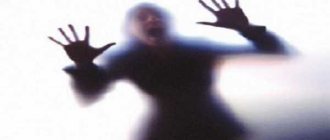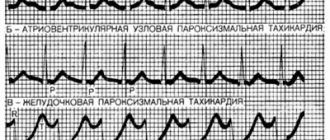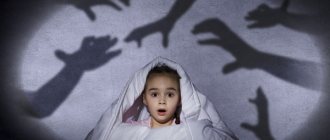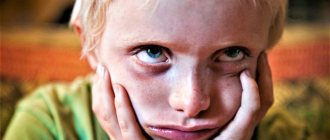The fear of going crazy or getting schizophrenia is a long-known fear, one of the most difficult and painful for a person. The painful state of foreboding clouding of the mind was noted by many famous people: philosophers, scientists, writers, composers. And, of course, they are not the only ones. System-vector psychology shows the reasons for such fear, which means it makes it possible to get rid of it. Most often, the fear of going crazy or getting schizophrenia is a symptom of overstress in the sound vector. To get rid of it, you must first find the root causes and roots of the experienced states.
Fears associated with the mind are obsessive states; they often occur at night, in silence, alone, when different thoughts enter your head.
Next to the fear of going crazy, there is another fear - the fear of stopping breathing, for example, in a dream.
What is the reason for such phenomena? Are they related?
Fear of going crazy
The fear of going crazy, of getting any disease associated with loss of mind, is a long-known fear.
People who are subject to this fear are often drawn like a magnet to any information about madness. They read scientific literature about schizophrenia, looking for information about primary and secondary signs of mental clouding. If earlier you had to go to the library to get this, now everything can be found on the Internet in literally 5 minutes. It would seem - how good! The more we read and learn, the more signs of mental illnesses we find in ourselves. For example, the so-called “talking to oneself,” “drowning” in one’s thoughts and seeming to disconnect from the outside world, obsessive thoughts about the meanings of different things, and so on.
The fear of going crazy and the fear of getting schizophrenia really have a basis and do not just come to mind. Often this is a wake-up call about unfulfillment, about the need to change something in life, to think and occupy your thoughts with truly important and necessary things. Which ones? First things first.
Fear of stopping breathing
Where do fears of going crazy and stopping breathing come from and how to get rid of them?
The fear of going crazy and stopping breathing are two fears that exist exclusively in people who have a sound vector. In principle, such thoughts cannot occur to anyone else.
A person with a sound vector by nature has a keen interest in knowledge. Even as a child, he wants to find the answer to various questions about the eternal and infinite. He is interested in why he was born and what will happen after his death. Focusing on his own thoughts is what sets him apart from other people.
All sound engineers subconsciously know that the mind is their strong and weak point at the same time. Strong - because only they have the opportunity and ability to find out all the answers to the questions of the universe, to really know everything they want. Weak - because the line between a complete understanding of the world and its complete misunderstanding is very fragile, practically non-existent. And enlightenment, understanding of everything in the world can immediately be replaced by the opposite state - complete darkness and darkness. Hence the fear of going crazy.
Of course, it is the sound people who suffer from mental disorders. This often occurs due to injuries treated in childhood. With proper development, a sound child can reach simply unprecedented heights in physics or mathematics, for example. But with constant trauma, the sound artist gets sick - a complete withdrawal into himself, a separation from understanding the surrounding reality as it is.
An adult sound person who grew up in normal conditions and did not receive serious psychological trauma in childhood cannot develop schizophrenia. But somewhere deep in the subconscious he remembers critical moments from childhood, stress. And for the rest of his life, the fear of going crazy remains in him. But if a person is fully realized in life, then this fear does not surface. But during times of overexertion and stress, the fear of going crazy tends to manifest itself.
Since people who are truly sick with schizophrenia also have a sound vector, but in a negative, unhealthy state, in the description of their illnesses you can find many manifestations of this very sound vector. It is not surprising that healthy sound people find in the descriptions of patients some similarities with themselves, their thoughts and actions. Which further increases the fear of going crazy.
The fear of going crazy and getting schizophrenia cannot be eliminated with the help of pills. Because it is just a symptom, not the disease itself. A sign that it’s time to change something in life.
The sound vector in a person can be compared to a huge black hole that wants to absorb all the knowledge about the world around it. The sound vector is so bottomless and huge that it cannot be satisfied with small handouts and ideas. Depression of a sound person makes him forget about everything in the world, even such primitive things as food or sleep. What is simple and easy for others - for example, breathing, for a sound person in a depressed state - is difficult and even overwhelming. He begins to put a thought process into his every action, into every step, and this is confusing. As a result, failure may occur in the simplest physiological processes. Or rather, a failure cannot happen, but to us, sound engineers, it seems so, because we know how to breathe correctly only by instincts, but not by our minds.
Where is the way out?
In order not to experience the fear of going crazy, getting schizophrenia, or stopping breathing, you need to learn to understand yourself. The problem is that a sound person can stop experiencing stress in the only case: by realizing his vector, understanding his purpose.
The more we run away from our purpose, the more we try to hide from our questions in everyday life, for example, work or career, films on fantastic themes or maybe in computer games, the more we enter into this same super-stress. Because you can't run away from yourself. The more we cease to understand the outside world, the more we focus on ourselves, the more the black hole of the sound vector grows, the more the fear of getting schizophrenia, going crazy, and stopping breathing rises in us. Moreover, what is given by nature cannot disappear.
The only way to get rid of the torment for a sound person is to finally understand what a sound vector is. Understand yourself, rethink
Medical illiteracy pushes people to look for any diseases in their own bodies. Only an experienced specialist who understands the finest details of the disease’s manifestations, signs, and symptoms can diagnose the disease. Fear of schizophrenia is common, but mental disorders are fortunately quite rare.
Fear of schizophrenia is often associated with a person’s independent attempts to diagnose himself
According to medicine, schizophrenia is a whole group of psychopathic disorders with different courses, forms, and types. This also includes epilepsy, organic thinking disorder, etc. In the presence of neurosis, personality disorder, obsessive states, one cannot immediately assume that schizopathy has set in. These are borderline states, and if you influence them adequately and in a timely manner, you can get rid of mental illness without consequences. But we also need to remember that the fear of becoming schizophrenic does not arise in everyone, but in people who have every reason to lose their minds.
How justified is the fear of schizophrenia?
Even experienced doctors say that there are no absolutely healthy people. There is hardly a person who would not notice certain oddities in himself. Fear of the dark, crowds, noise, confined spaces and other phobias also belong to a certain type of disorder. Almost everyone, after listening to a song, constantly plays an obsessive melody in their head. It turns out that this is also a mental disorder.
In the presence of neurosis, personality disorder, obsessive states, one cannot immediately assume that schizopathy has set in
But don’t panic, all this is tolerable and fits into the framework of normal existence. The fear of becoming mentally inadequate most often haunts those who have obsessive states - neuroses. As a rule, they suffer from a lot of phobias, including lissophobia - the fear of going crazy.
Important: the Internet plays a big role in lissophobia with a lot of articles and publications about schizophrenia. It is easy for an ignorant person who does not understand the symptoms and course of a mental illness to detect one or another sign.
People with frequent depression most often suffer from the phobia of losing their minds. At the moment of exacerbation of mental torment, many of them are sure that they are not capable of anything and believe that they have become schizophrenics.
Fear of getting schizophrenia: how to identify the disease
There is a specific moment at which you can understand whether there are symptoms of a psychopathic disorder or not. Even a person suffering from depression can recognize the signs. He understands that there are mental problems and tries to fight the illness without denying the problems. All obsessive states and phobias evoke a desire to get rid of them and undergo an adequate course of therapy. As for those who actually suffer from mental disorders, the problem here is denial of the illness.
Fear of developing schizophrenia most often occurs in people prone to depression
Important: the patient is ready to go ahead in order not to undergo treatment and, moreover, begins to hate loved ones who want him to recover. Why is it so difficult for them to agree with their “deplorable” situation? There are reasons for this, and very justified ones.
Causes of mental disorders
According to the findings of a number of scientists who have been working to identify the causes of the disease for many years, there are a number of factors that provoke mental disorders.
- Heredity - transmission of a disease at the genetic level from parents, grandparents, etc.
- Psychoanalytic . The disease occurs against a background of stress, infectious diseases, injuries, and overexertion.
- Dopamine - an excess of this hormone affects the functioning of nerve impulses.
- Dysontogenetic - the disease is already embedded in a person’s genes, and due to external factors - trauma, stress, infection, etc., it “pops up” to the outside.
Treatment of phobia
Treatment of obsessive-compulsive disorder occurs at any stage. A phobia without pronounced symptoms threatens the individual. It distorts the perception of the world and affects the patient’s work and personal relationships. The fight against phobia occurs in a comprehensive manner:
- the root cause of increased anxiety is determined,
- concomitant phobias and disorders that need treatment are identified,
- the patient undergoes a medical examination to exclude pathologies of internal organs,
- a patient with a phobia undergoes psychotherapy,
- group work is carried out with the close circle of the victim of a phobia,
- drug therapy is prescribed,
- The patient is rehabilitated (stress resistance increases, hidden fears are combated).
A psychotherapist prescribes complex treatment. It determines the degree of neglect of the phobia and its consequences. It is important to highlight associated fears. They interfere with treatment and create the preconditions for the return of the fear of going crazy.
Cognitive behavioral therapy
Therapy designed to combat personality attitudes. Stable concepts that prevent one from perceiving the situation objectively are destroyed through an appeal to consciousness: therapy is based on the work of the patient and the doctor. The task of a psychiatrist is to help the patient reach a logical conclusion, and not to impose new attitudes on him.
Cognitive behavioral therapy consists of a frank conversation with the patient, auto-training and work on thinking. At the first appointments, therapy is aimed at existing symptoms: the doctor listens to the patient’s complaints, records each condition that the patient has to experience.
Established beliefs formed in childhood are addressed after a trusting relationship is established between the patient and the doctor.
After identifying the cause of the automatic thought, the patient works through each fear: there is no point in fighting the defensive reaction, it is necessary to understand the mechanism of its operation. Self-training at home will help you tune in to positive thinking and get rid of anxious thoughts and worries. The essence of auto-training is to pronounce certain phrases or affirmations that help rebuild ingrained thinking.
Drug therapy
As drug therapy, the patient is prescribed tranquilizers and sedatives. You cannot take antidepressants on your own. Without identifying the cause of lissophobia, sedatives will only do harm. Tranquilizers are taken according to the regimen prescribed by the doctor: potent drugs affect a person’s behavior and reactions, reduce ability to work and cause drowsiness.
In addition to drug therapy, physical exercise is prescribed. They will help increase the body's defense mechanisms and strengthen body tone. Without comprehensive work, it will be possible to achieve only temporary results that will reduce anxiety, but will not relieve the phobia of developing schizophrenia.
How does the disease manifest itself?
Seizures of schizophrenia have a different character, it all depends on the type and form of the disease. But there are common symptoms that are common to almost all forms of mental illness.
- Speech is impaired, there is delirium, sudden switching to another, strange topic, and tongue-tiedness.
- Complete lack of initiative, lack of will and independent actions.
- Inappropriate reaction to actions and statements, lack of emotions.
- Delusions of grandeur, persecution, constant manifestation of one's own exclusivity.
Seizures in mental disorders
- When mental illness worsens, the first thing that occurs is anxiety for no reason.
- The sufferer is “attacked” by non-existent voices and communicates with ephemeral personalities and creatures.
- Insomnia occurs, the patient often wakes up and walks from corner to corner.
- There is a loss of appetite or, on the contrary, gluttony. In this state, a schizophrenic can eat a portion many times greater than the daily norm.
- There are outbreaks of aggression, anger, or the sick person hides in a corner, refuses to communicate with loved ones, and completely withdraws into himself.
- There is a desire to run away from home.
- The patient becomes distrustful and may stop recognizing a loved one.
A person during an attack begins to worry for no reason
Important: the listed attacks in medicine are called psychosis. They require urgent relief, for which you need to seek help - call a psychiatric team.
Alcohol psychosis
Very often, with prolonged abuse of alcoholic beverages and drug use, psychosis occurs, which is confused with the first attack of schizophrenia (manifestation). The symptoms caused by severe intoxication of the body are indeed similar to mental illness, but there are still distinctive features:
- Delirium tremens . Due to withdrawal from alcohol and drugs, the patient sees phantom creatures: devils, goblin, spiders, flies, etc., and tries to catch them. A common hallucination is the head of a dog, which the sufferer may talk to or be afraid of. The characteristic signs of behavior of a mentally ill person who has an attack of schizophrenia are reflected in the video, of which there are a huge number on the Internet.
- Hallucinations . Voices are heard that can threaten, order, criticize. In such cases, patients are sure that others also hear non-existent sounds.
- Brad . It occurs against the background of prolonged alcohol intoxication and is characterized by persecution mania and fear of being poisoned.
- With prolonged consumption of alcohol, brain cells are affected and encephalopathy . An alcoholic develops symptoms of schizophrenia: delusions, hallucinations, attacks of aggression, anger, and he becomes uncontrollable. In severe cases, hospitalization in a specific institution is required.

The most dangerous phase is considered to be the acute phase of schizophrenia.
Fear of schizophrenia with neurosis
Nervous system » Disorders » Fear of schizophrenia in neurosis
- If you have questions for the consultant, ask him via a private message or use the \"Ask a Question\" form on the pages of our website.
You can also contact us by phone:
- 8 495-632-00-65 Multichannel
- 8 800-200-01-09 Calls within Russia are free
Your question will not remain unanswered!
We were the first and remain the best!
In conditions of a long-term unconscious conflict, a person is not able to resolve the situation that has arisen: satisfy a personally necessary need, change his attitude towards it, make a choice, make an adequate decision.
The basis of pathological fears (phobias), hypochondriacal thoughts, panic attacks, mental pain is deeply hidden anxiety (a signal of internal conflict). It is a defense mechanism in the conflict between unacceptable impulses from the unconscious and the suppression of these impulses.
Anxiety is caused internally and is associated with external objects only to the extent that stimulation of internal conflict occurs.
With the help of a psychotherapist or psychologist, you can become aware of a psychological problem, see ways to solve it, and work through a psychological conflict.
The goal of psychotherapeutic intervention is to resolve the conflict or change the attitude towards the conflict situation.
An important role in psychotherapy is played by teaching relaxation and emotional self-regulation.
Medicines for neurotic disorders are used in special cases. They usually give a short-term effect (that is, complaints and symptoms may return after stopping taking an antidepressant or antipsychotic).
“Fears, anxieties, phobias... How to get rid of them? » Dmitry Kovpak;
“Get rid of fear” by Yuri Shcherbatykh;
BRIAN M. ALMAN PETER T. LAMBRU “SELF-HYPNOSIS” chapter “Fears, Phobias, Anxieties How to get rid of them?” A GUIDE TO CHANGING YOURSELF.
A.V. Popov “FEAR (PHOBIA) AND ANXIETY: HOW TO LIVE WITHOUT THEM?”
Schizophrenia is one of the most famous mental disorders, the real symptoms of which are known to few. For most, this term refers to any mental disorder or deviation. There are many classified mental disorders, but most often people fear schizophrenia more than other mental disorders.
Mental disorders make people afraid of getting sick
How long does a schizophrenia attack last?
It is impossible to determine with accuracy how long a schizophrenic attack lasts. It all depends on the individual’s characteristics, the form of the disease, and aggravating circumstances. According to general data, there are several phases and each of them takes a certain period of time
Worth seeing: Thinking disorders in schizophrenia
- Acute (first) phase . The exacerbation lasts up to two months. The patient's thinking and memory deteriorate, and there may be a loss of interest in work, study, and favorite activities. The condition is aggravated by apathy, untidiness, and lack of initiative. The patient often experiences excessive sweating, headache, dizziness, rapid heartbeat, anxiety, and fears. With timely therapy, the prognosis is favorable, up to long-term remission.
- After effective relief of attacks, a stabilization stage . The process takes more than six months. The patient's symptoms are mild; in rare cases, delusions and hallucinations occur. Without medical intervention, the acute phase continues to acquire threatening signs: memory loss occurs, delusional thoughts intensify, and the patient hallucinates continuously. As a result, a complete loss of appetite and attacks of aggression with screaming and howling are possible. Suicidal tendencies are obsessive in nature.
Symptoms
The main symptoms of schizophrenia are changes in memory, way of thinking, and deterioration of attention. Disturbances manifest themselves in patients to varying degrees. A person cannot accept new information, his speech is modified and distorted. The conversation can become either concrete, when he answers only the question posed, without adding anything, or abstract: he speaks in neologisms, vaguely, using a minimum set of words. Sometimes the patient stops mid-sentence and uses illogical words.

Memory deteriorates, and all its varieties become worse: short-term, verbal, long-term, working... Sometimes insomnia occurs. The symptoms of schizophrenia, the symptoms and treatment of which depend on the sick person, are unique, therefore treatment with standard drugs does not help much in getting rid of such deterioration. Sometimes their side effects worsen the situation, and a person quickly loses his inherent properties. There are a large number of recommendations on how to cure schizophrenia. Each of them involves visiting a doctor.
Hallucinations
They can be like visions or obsessions. Characteristic of paranoid schizophrenia, the symptoms and signs of which are distinguished by their originality. A world is being invented in which reality is distorted. Voices may sound in the patient's head, and he may experience hallucinations. Auditory, tactile, olfactory, gustatory, visual and other disturbances occur in the perception of the surrounding space.
It is important to understand how to recognize schizophrenia and its characteristics. For example, hallucinations are divided into true and false. The initial variants of the disease involve inventing voices, images of something/someone in real rooms, they are nearby and visible to the patient. In the second option, hallucinations occur in the patient. He claims that worms are crawling inside him, he feels them. His movements are controlled by someone sitting in his head.
You should understand how to recognize a schizophrenic. Such a person's perceptions may be distorted in simple or complex ways. First, noises arise, sounds that disturb you irregularly. In the second case, whole situations arise when a person paints whole pictures, worlds in his image. The main symptoms of hallucinations:

- talking to yourself;
- change in mood and behavior to the opposite. A person is disturbed by internal images, he is distracted by them;
- manifestation of unjustified emotions, for example, laughter for no reason;
- anxiety, detachment when conducting a conversation.
If we talk about how to recognize a schizophrenic, you should understand some of the behavioral features of such people. Sometimes the patient perceives himself as a different person. Experts, when detecting such problems in a person, do not recommend mocking the person, discussing with him the images and pictures that have arisen in his head, or convincing him that everything is unreal.
Rave
Patients often express delusional assumptions and obsessions. The reason is processes occurring in the head that are not affected by information received in the real world. The inner consciousness begins to work, disrupting the individual’s activity and perception of the world around him. Mania, such as persecution, often appears. Many people are concerned about whether schizophrenia can be cured. This can be answered in the affirmative only if there is help from others, understanding and the creation of the right atmosphere for the patient.
Sometimes the manifestations are so strong that a person suspects everyone of wanting to harm him. There may be a desire to punish the perpetrators when an individual begins to complain wherever possible so that someone can be punished. Often the person has the feeling that everyone is laughing at him. There are cases when a person invents diseases for himself and begins to look for confirmation of their presence in hospital rooms, therefore it is important to know how to define schizophrenia in order to understand that if symptoms are present, the disease exists.
Such manifestations of delirium are easily recognized by others. But with minimal deviations in this direction, when other symptoms are absent, it is quite difficult to recognize non-existent problems. For example, it is difficult to diagnose a pathological feeling of jealousy. A particular danger is the possibility of harming oneself, blaming oneself for something unreal. Often such sensations are accompanied by insomnia and suicidal behavior.
Serious crimes are often committed by people in such a state. They are not aware of the reality of events and obey the voices inside their heads. Afterwards, reality may cease to be perceived, or everything becomes normal. Schizophrenia is partially treatable, so it is important to prevent this from happening by consulting a doctor in a timely manner.
Tips on how to understand that a person has schizophrenia, the signs of which are the occurrence of delusions:
- The personality’s behavior changes, aggressiveness appears, which is not motivated by anything.
- Implausible stories arise, similar to colorful dreams, imaginary pictures and unusual worlds take place.
- Strong unreasonable fear for your life.
- Fear, manifested in the desire to isolate yourself from people, to find yourself in solitude, imprisonment. Turns into fear of any contact.
- Complaints to all sorts of authorities without any real reason.
If a person experiences such manifestations, it is advisable to contact specialists to conduct an examination of the person. Knowing whether schizophrenia is curable and understanding its main features, it is possible to identify the disease if the stages are early.
Aggressive behavior

Knowing what schizophrenia is and how it manifests itself, you can understand what to do in certain difficult situations. Aggression is understood as human behavior in which the goal is to harm another person mentally or physically. Healthy people also have similar outbursts of anger that arise as a result of provocations from the other side. But if a person suffers from schizophrenia, the treatment of which is extremely difficult, outbursts of this nature can arise on their own, without any reason, and not as a defensive reaction.
In schizophrenia, such outbreaks occur as a result of changes in thinking and incorrect perception of the surrounding reality. The individual experiences severe insomnia, increased excitability, and a reluctance to communicate normally with others. Sometimes unjustified suspicion arises, which gives reason to suspect the presence of a disease.
The causes of schizophrenia are unclear, but according to statistics, males experience 6 times more cases of aggressive behavior if a person is sick. In sick women, aggression manifests itself 15 times more often. It can manifest itself as unreasonable jealousy, which also happens more often in women. People who abuse alcohol display aggressive behavior much more often.
There is a set of symptoms that increase the risk of groundless aggression. If a patient has delusions of persecution, visions, if he has a tendency to behave inappropriately, obsessive states arise, he abuses alcohol, and the person often shows unreasonable aggression.
In a fit of uncontrollable anger, deplorable situations often arise when the patient takes the life of another person. You can talk for a long time about how to remove the diagnosis of schizophrenia, but it is important to know that the disease is very complex and requires long-term treatment.
In the paranoid form of the disease called schizophrenia, attacks of aggressiveness are most often observed. The catalyst may not be external activity, but internal images and thoughts. With a tendency to display impulsiveness, restlessness, aggression often becomes dangerous to others. A person is sent for compulsory treatment because there is a risk of rash, dangerous actions.
Motor changes
Such disorders occur not only in schizophrenia, the types of which differ in their main features. There may be complete stupor or overly active behavior. With strong excitement, patients become restless, meaningless, incoherent speech appears, sometimes mimicking, repeating one sentence. All this is interrupted by manifestations of complete indifference, after a stormy flow of words - by long silence.
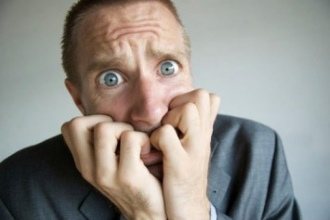
In a state of catatonic excitement, the patient may be aggressive towards others. There is often a danger to his life or that of others. The personality stops responding to requests and is not aware of reality. Such attacks can only be eliminated with medication. Problems often arise at night, when schizophrenic people are dreaming, or during periods of insomnia.
The peak of the condition appears within two hours. Therefore, it is important for close people to be able to respond to the situation quickly and adequately. It is important to know how to diagnose schizophrenia, at least its first signs, in order to promptly contact doctors for help.
Catatonic stupor is characterized by other symptoms. The person does not show bouts of restlessness; on the contrary, he completely stops moving. The muscles are very tense, but can remain flexible for a long time. There is no reaction to the outside world, the person does not eat, the eyes do not move, focusing on one point. Diagnosis of schizophrenia is difficult, so the doctor is in no hurry to make a diagnosis based on some similar symptom, although he knows how to treat the disease. It takes a long time to identify the disease. therefore, one of the signs does not indicate the presence of the disease at all.
If it is necessary to change the patient's position, no response follows, no difficulties arise. Negative attacks occur when the reaction to the outside world is negative. The brain registers the address to the person, but has no desire to engage in conversation. People around you are ignored.





